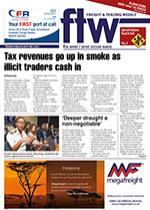Illicit financial flows (IFF) saw an average of $138 to $289 million siphoned from the Mozambican market between 2005 and 2014. This was equivalent to 9% of the government’s total revenue in 2017, said Amelia Nakhare, president of the Mozambique Revenue Authority (MRA). “The general attorney also estimates that the fraudulent use of the financial system with IFFs cost Mozambique $26.4 million in 2016 alone,” she said. “Even though Mozambique is not a regional financial centre, money laundering is reported to be fairly common and is linked principally to narcotics trafficking and criminal kidnapping networks as well as customs fraud.” She said black markets for smuggled goods and informal financial services were widespread, constraining the formal retail sector in most
parts of the country. “Considering that Mozambique serves as a logistics corridor for several countries in the region, dealing with illicit trade has been challenging,” said Nakhare. “There is a lack of legislation to support criminalisation of various forms of illicit trade and the existence of natural resources draws criminals.” She said corruption at various levels in the supply chain further aggravated the situation. “We have to understand that illicit trade destabilises established industries and restricts legitimate trade and investment, reduces government revenue and the capacity of the economy to provide formal jobs - not to mention the danger that these products pose to the health and safety of consumers.” Moreover, said Nakhare, it represented a very real risk to southern Africa’s natural
resources, especially for protected species, extractive resources and the environment. Weak governance, corruption and inadequate law enforcement exacerbated it further. According to Nakhare the fiscal impact of illicit trade was increasing. She said between 2010 and 2018 associated duties for illicit goods seized represented around 3 to 4% of Mozambique’s total annual revenue. “We simply cannot continue this way and the MRA has introduced fiscal sealing as an instrument to control trade in products highly associated with illicit trade in an attempt to reduce smuggling and increase revenue collection,” she said. “The MRA introduced in 2017 the sealing of alcoholic beverages and manufactured tobacco as a measure of fiscal control of its production, importation, circulation and marketing.”
Implemented through a series of phases, Nakhara said the implementation of compulsory fiscal sealing of alcoholic beverages and manufactured tobacco has proved to be the right decision with positive results. “The excise collection in customs grew by 6% and 32%
respectively in 2017 and 2018, and the contribution due to sealing was 17% and 24% respectively.” At the same time seizures of alcohol have increased significantly during the past two years. This, said Nakhare, was related to the fiscal stamp project.
Moz intervention makes an impact on illicit financial flows
08 Mar 2019 - by Liesl Venter
0 Comments
FTW 8 March 2019

08 Mar 2019
08 Mar 2019
08 Mar 2019
08 Mar 2019
08 Mar 2019
08 Mar 2019
